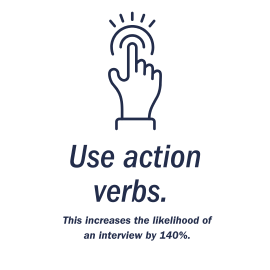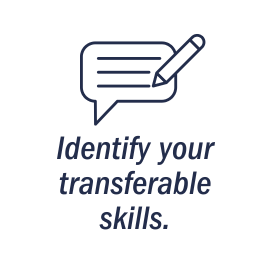
A Resume is -
-
A marketing tool
-
An individually designed document
-
Highlights your background, experience, and skills
-
Used by employers as a screening device
-
One piece of the job search
VMock
Use VMock to create your resume or get feedback on an existing resume.
What's on a Resume?
- Identifying Information
-
Name, address (permanent and temporary), telephone and e-mail
If you have an e-portfolio, professional blog, or LinkedIn profile, you may choose to include that information as well. .
- Objective
-
If you choose to include one, it should be a short, specific statement that includes position, industry, and relevant skills.
- Education
-
In reverse-chronological order, include the schools you have attended, dates of graduation or dates of attendance, as well as degrees sought or completed.
- Experience
-
This section includes work, volunteering, extracurricular activities, research or field experiences. Names and locations of employers and dates of employment should be included. Employers will read top to bottom, so make sure the most relevant sections are at the top of the page.
Resumes Should ✅
- Follow all writing, grammar, and language conventions
-
Be professional, succinct, and concise
-
Use an active voice
-
Include specific info: figures, dates, numbers
Resumes Should Not⛔
- Use personal pronouns
-
Include articles: a, an, the
-
Use unnecessarily lengthy explanations
-
Show skills or experiences you don’t possess
Tips for Formatting a Resume
Reverse Chronological Order
A chronological style is usually recommended for college students. In a chronological resume, items are arranged in reverse-chronological order within topic areas (education, experience, etc.).
If only some of your experience is relevant, you can divide it into two blocks: “Related Experience” (or “Teaching Experience”, for example) and “Additional Experience.”
Bullet v Paragraph
The bullet format presents information in a concise, easy to follow manner; however, because each description is on a separate line, the page fills up quickly.
In contrast, the paragraph format allows for more text on the page, but can come across as dense and overwhelming, and thus lose the interest of the reader.
Formatting and Layout
Your resume should be visually attractive, well organized and easy to read.
- Avoid resume templates—the automatic formatting will limit your options. Find a resume you like and copy its style.
- Avoid large blocks of text (i.e. more than 10 lines).
- Keep it to 1 page. As a general rule, one page is the recommended length for undergraduates. This may vary if you have extensive experience.
- Keep margins wide (no smaller than 0.5”) and even.
Fonts
- Only use one font type.
- Use standard, readable fonts like Helvetica, Bookman, Arial, and Times New Roman.
- Keep font size within 10-14 points.
- Do not use script fonts. Boldface and italics are better ways to highlight something.
- Don’t compress the space between letters; you want your resume to be readable!
Visual Printing
- Avoid color, graphics, and shading.
- If you use lines, put at least 1/4 inch of white space around them.
- If printing, always send originals on light-colored 8 1/2" x 11"paper.
- Don’t fold or staple your resume.
Next Steps
Click on each drop down box to find strong resume verbs
- Communicative
-
- address
- arbitrate
- arrange
- author brief
- communicate
- compose
- confront
- contact
- convince
- correspond
- describe
- develop
- direct
- document
- draft
- edit
- enlist
- express
- follow-up
- formulate
- influence
- inform
- interpret
- interview
- lecture
- market
- mediate
- meet
- moderate
- negotiate
- network
- persuade
- present
- promote
- publicize
- publish
- question
- read
- reconcile
- recruit
- refer
- report
- rewrite
- speak
- suggest
- summarize
- Creative
-
-
act
-
broaden
-
compose
-
conceive
-
conceptualize
-
conduct
-
create
-
design
-
develop
-
direct
-
discover
-
draft
-
dramatize
-
draw up
-
entertain
-
establish
-
execute
-
explore
-
fashion
-
forge
-
found
-
illustrate
-
imagine
-
improvise
-
institute
-
integrate
-
introduce
-
invent
-
market
-
modernize
-
originate
-
perform
-
pilot
-
pioneer
-
plan
-
redesign
-
rehearse
-
remodel
-
renovate
-
replace
-
revitalize
-
shape
-
sketch
-
spearhead
-
start
-
stimulate
-
strategize
-
transform
-
- Organizational
-
-
approve
-
arrange
-
catalogue
-
classify
-
collaborate
-
collect
-
compile
-
conserve
-
consolidate
-
cut
-
diagram
-
dispatch
-
distribute
-
enlist
-
execute
-
expedite
-
extract
-
generate
-
identify
-
implement
-
inspect
-
integrate
-
interface with
-
join
-
list
-
log
-
monitor
-
operate
-
organize
-
pinpoint
-
prepare
-
prioritize
-
process
-
record
-
reshape
- reorganize
-
retrieve
-
revamp
-
revise
-
schedule
-
screen
-
set up
-
shape
-
specialize
-
specify
-
streamline
-
stretch
-
substitute
-
systematize
-
tabulate
-
target
-
update
-
validate
-
- Managerial
-
-
administer
-
account for
-
analyze
-
appoint
-
approve
-
assign
-
assume
-
attain
-
chair
-
choose
-
contract
-
consolidate
-
consult
-
decide
-
delegate
-
determine
-
develop
-
devote
- direct
-
dispatch
-
dispense
-
employ
-
evaluate
-
execute
-
formulate
-
handle
-
head
-
hire
-
leverage
-
manage
-
maintain
-
orchestrate
-
order
-
organize
-
oversee
-
plan
-
perfect
- preserve
-
prioritize
-
produce
-
propose
-
protect
-
realize
-
recommend
-
recruit
-
regulate
-
review
-
revitalize
-
reward
-
save
-
set goals
-
schedule
-
supervise
-
terminate
-
unify
-
withdraw
-
- Financial
-
-
account for
-
adjust
-
administer
-
allocate
-
analyze
-
appraise
-
audit
-
balance
-
buy budget
-
calculate
-
compute
-
control
-
develop
-
estimate
-
finance
-
forecast
-
manage
-
market
-
monitor
-
plan
-
procure
-
project
-
purchase
-
reconcile
-
- Research
-
-
acquire
-
amplify
-
analyze
-
calculate
-
chart
-
clarify
-
collect
-
compare
-
conduct
-
evaluate
-
examine
-
extract
-
formulate
-
critique
-
diagnose
-
design
-
determine
-
disprove
-
identify
-
troubleshoot
-
study
-
summarize
-
survey
-
systematize
-
test
-
modify
-
organize
-
process
-
review
-
research
-
inspect
-
interpret
-
interview
-
investigate
-
locate
-
- Results
-
-
achieve
-
accelerate
-
accomplish
-
affect
-
eliminate
-
complete
-
compound
-
contribute
-
decrease
-
double
-
add
-
advance
-
attain
-
augment
-
award
-
enlarge
-
establish
-
exceed
-
map
-
increase
-
initiate
-
introduce
-
launch
-
lower costs
-
excel
-
expand
-
extend
-
fortify
-
improve
-
maximize
-
measure
-
obtain
-
pioneer
-
trim
-
triple validate
-
widen
-
selected as
-
stabilize
-
standardize
-
succeed
-
transform
-
prove
-
reduce
-
re-establish
-
resolve
-
restore
-
- Teaching
-
-
accept
-
coordinate
-
correct
-
define
-
demonstrate
-
command
-
communicate
-
compliment
-
consider
-
cooperate
-
categorize
-
challenge
-
choose
-
clarify
-
coach
-
appraise
-
assess
-
assign
-
attend
-
calm
-
adapt
-
advise
-
actively
-
analyze
-
apply
-
encourage
-
develop
-
direct
-
discipline
-
doubt
-
educate
-
designate
-
investigate
-
judge
-
listen
-
initiate
-
inquire
-
instruct
-
interact
-
integrate
-
implement
-
incorporate
-
indicate
-
infer
-
inform
-
focus
-
generate
-
guide
-
hypothesize
-
identify
-
evaluate
-
excite
-
explain
-
explore
-
facilitate
-
elaborate
-
elicit
-
emphasize
-
enable
-
model
-
modify
-
theorize
-
synthesize
-
systematize
-
teach
-
tell
-
thank
-
solicit
-
speculate
-
state
-
stimulate
-
structure
-
rephrase
-
reward
-
set goals
-
set standards
-
simplify
-
postulate
-
praise
-
provoke
-
question
-
reinforce
-
motivate
-
observe
-
organize
-
persuade
-
ponder
-
Identify the transferable skills below that apply to you and write down specific examples of when, where, and how you used the skill.
- Communication
-
The skillful expression, transmission and interpretation of knowledge and ideas.
- Speaking effectively
- Perceiving nonverbal messages
- Writing concisely
- Persuading
- Listening attentively
- Reporting information
- Expressing ideas
- Describing feelings
- Facilitating group discussion
- Negotiating
- Providing appropriate feedback
- Editing
- Research & Planning
-
The search for specific knowledge and the ability to conceptualize future needs and solutions for meeting those needs.
- Forecasting, predicting
- Solving problems
- Creating ideas
- Setting goals
- Identifying problems
- Extracting important information
- Imagining alternatives
- Defining needs
- Identifying resources
- Analyzing
- Gathering information
- Developing evaluation strategies
- Human Relations
-
The use of interpersonal skills for resolving conflict, relating to and helping people.
- Forecasting, predicting
- Solving problems
- Creating ideas
- Setting goals
- Identifying problems
- Extracting important information
- Imagining alternatives
- Defining needs
- Identifying resources
- Analyzing
- Gathering information
- Developing evaluation strategies
- Organization, Management & Leadership
-
The ability to supervise, direct and guide individuals and groups in the completion of tasks and fulfillment of goals.
- Forecasting, predicting
- Solving problems
- Creating ideas
- Setting goals
- Identifying problems
- Extracting important information
- Imagining alternatives
- Defining needs
- Identifying resources
- Analyzing
- Gathering information
- Developing evaluation strategies
- Work Survival
-
The day-to-day skills that assist in promoting effective production and work satisfaction.
- Forecasting, predicting
- Solving problems
- Creating ideas
- Setting goals
- Identifying problems
- Extracting important information
- Imagining alternatives
- Defining needs
- Identifying resources
- Analyzing
- Gathering information
- Developing evaluation strategies








